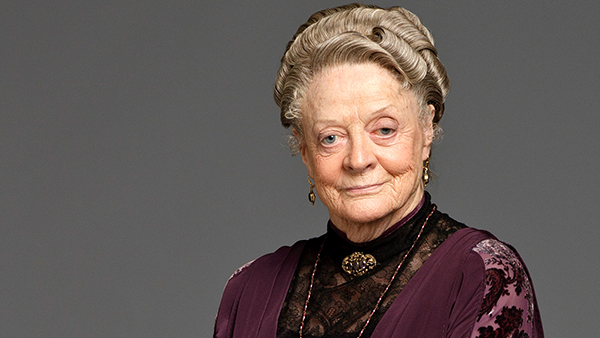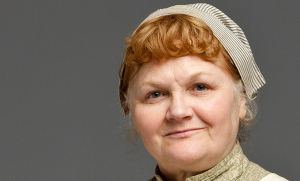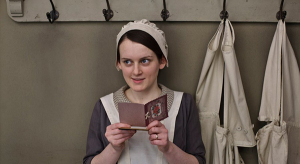Earlier this week, Royal Oak lecturer Tessa Boase examined what sorts of behaviors you don’t see from servants on Downton Abbey. From hiding in cupboards to weighing dirt, english country house servants took on lots of thankless tasks, many of which haven’t made it to the small screen through Downton Abbey.
In fact, there were so many tough – and overlooked – jobs, that Tessa couldn’t fit them all in one post. Here are 5 more things you won’t see on Downton Abbey:
1. Mrs Patmore black-leading the range
Before anything could be cooked, the range had to be cleaned, black-leaded and stoked. Manuals devoted whole chapters to this unpleasant job. ‘Take out the ashes, if necessary sprinkling them with wet tea-leaves to stop them flying around. Pick out the larger cinders and sift the rest of the ashes, retaining all the cinders as a base for the new fire. If there is an oven attached, clean out the ashes from under this. Sweep the grate from the top with a hand brush and sweep the inside of the oven. Fill the boiler while grate is still cold.
‘Next mix some powdered black-lead with enough cold water to make it as thick as batter; put it on the grate with a small round brush, beginning at the top and working downwards. Brush off the black-lead with another brush and then polish the grate vigorously with a dry brush. Three brushes are thus used.’
Three brushes! In truth, the grander country house cook would have an underling for this sort of job. It was the poor ‘cook generals’ in smaller, middle class houses that had to do it themselves.
2. Daisy Mason washing up
In the wealthy houses of the early 20th-century, the amount of washing up was obscene. One ex-butler Albert Thomas reckoned that a modest dinner for ten people required 324 items of silver, glass and china, not counting the saucepans and dishes in the kitchen. In the 1920s, before modern detergents, washing up was done with soda, which left the hands raw. Kitchen maids would have hardened, red hands and arms, chapped to the elbow by their late teens. An alternative to soda was soft soap, horribly slippery, so that breakages were frequent. Vinegar and silver sand or Vim and wire wool were used for scouring saucepans – punishing work. Stainless steel didn’t exist; knives had to be cleaned in a machine using a type of emery powder, turning the handle like an organ grinder. The grander houses had a dedicated ‘knife boy’.
3. The Dowager Duchess going to the loo
This was a difficult subject for the Victorians and Edwardians. Bodily functions were absolutely denied by the upper classes. Going to the lavatory? ‘No decent person did it, most certainly no lady,’ remembered one lady, Ursula Bloom. ‘It was regarded as the height of vulgarity. Whatever personal discomfort or danger it entailed, one was secretive about it. The fact that it was a necessity to man, and to rich and poor alike, was disregarded. Nobody who was anybody tolerated it.’
So the lavatories of even the really grand country houses were as nasty and as uncomfortable as was humanly possibly. Non-absorbant toilet tissue was available, but you were just as likely to get torn up bits of newspaper. Yes, even for the bottom of the Dowager Duchess of Grantham.
If this was the norm for the upper classes, just imagine the servants’ toilets. These were usually outside privies: dirt long-drop latrines with a bucket of lime powder to sprinkle over your doings. Scraps of newspaper were spiked onto a rusty nail if you were lucky.
4. Anna Bates carrying a potty
The chamber pot was far more convenient and comfortable than the lavatory. Emptying the upper classes’ potties brought servants into an extraordinarily intimate relationship with their employers. Do we ever see Anna Bates emptying Lady Mary’s slop pot? We don’t. This, though, would be a job for the chambermaid in a really large household, who would ‘do’ the bedrooms while the family was at breakfast. The washstand was ‘slopped’ (rinsed out); three different cloths were used for mouth glass, basin and chamber pot (a rule vulnerable to abuse by disgruntled maids). One housekeeper, Mrs Courtenay of Shugborough Hall in Staffordshire, remembered how ‘slopping’ had to be done before and after every meal: breakfast, lunch, afternoon tea at 3pm, dinner and bedtime.
The full chamber pots were carried down the back stairs and emptied down a specific sink – or their contents were used. Ex butler Ernest King swore by urine as a means of cleaning a muddied, scarlet hunting coat. ‘When in this state we would ask the housemaid to save us the contents of the chamber pots, at least a bucketful. It was truly miraculous in getting the dirt out. That was immediately followed by brushing with clean water.’
5. Mr Carson treating his bunions
How long did the average country house butler live? And why did so many die on the job? The 9th Duke of Richmond and Gordon remembered Marshall, the butler of Goodwood House, ‘a white-haired, splendid butler, a lovely man, never went to bed until we had. I said to him once, “I’m a bit worried about you. I want to see how far you walk.” So I got one of those pedometers and put it in his pocket, and found he’d walked nineteen and a half miles in one day, all over the house. Amazing people, and they never complained. He died with us: overwork, I should think.’
Don’t miss Tessa’s lectures, or any of the other exciting speakers coming to Royal Oak audiences across the country throughout the Fall. Learn more








